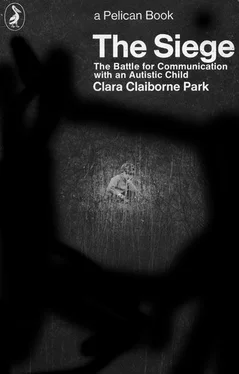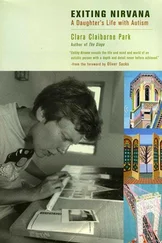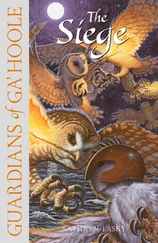My neighbour’s little boy is almost three and very slow to talk-they are worried about him. He wanders over to me, looks up at my face, points to the swing. The noise he makes is totally unintelligible, but I understand it: ‘I want.’ I put him on the swing. Not to worry; he'll come out of it. Elly is eight years old now. I have still never seen her point. She has a vocabulary of hundreds of words. But although it includes ‘rectangle’, ‘square’, and ‘hexagon’, it does not include ‘What’s that?’
Children vary in the intensity of their desires, and the aggressiveness with which they express them. Some babies are reasonably self-sufficient from birth — ‘good’ babies, active and contented in their playpens, cheerful among their toys. Others are demanding and dependent. These we try to reassure, to lead gently towards self-sufficiency. We think of self-sufficiency, as a virtue, even among babies — as a forerunner of independence, of inner resource.
It is some time before it occurs to a busy mother, with three other children, that a baby can be too self-sufficient.
Elly did not point. Nor did she try to get objects that were not within her reach; she seemed unconscious they were there. Content in crib or pen, when removed from them she crawled freely from room to room. But it was motion, not exploration. She did not push or poke, open drawers, pull at lamps or tables. At twelve months, when she began to crawl, I got ready the gates that we had used to keep the other three children from falling downstairs. I never used them. Elly did not try to go down, and there was never a question of her falling. Unconscious of so much, she was conscious of the location of every edge or limit; she could be left safely on any bed. She accepted limits, with an acceptance so natural it seems clear that it was a welcome. She made no move to climb the stairs, but one day, in play, her sister taught her to crawl up. She learned easily enough, and I thought the new skill would mean the usual extension of a baby’s possibilities. She learned on a Friday. We went away that weekend to a stairless household, and when we came back the Sunday it did not occur to us to review her new skill. It was six months before she crawled upstairs again.
She had eaten at the table with us ever since she was old enough to sit upright. We put food on her plate, as for any baby; she picked it up in her fingers and ate it, or allowed me to feed it to her, or refused it; she did not see or ask for anything anyone else was eating. She asked for nothing, reached for nothing. She was content. Not impassive — she smiled, even laughed-but content.
Only now and then something went wrong, something trivial in everything but its effect on Elly. Her milk was served in a glass, perhaps, instead of her silver cup, or it was offered her after the meal instead of before. It was difficult to guess what was wrong, since she gave us no clue, but it was important to find out, for she would cry violently until we managed to get things right again, crying that seemed all the more remarkable in contrast with her usual serenity.
We had not thought of retardation, but after the hospital examination we thought of it constantly as we waited for the six months to pass. If a two-year-old is late walking, does not talk or understand, plays repetitively or not at all, what should she be but retarded? We thought and the doctors thought we saw alertness, but a child’s look of intelligence is an intangible, a construct of the imagination. What is tangible, what is operational, is what a child does, and from one day’s end to another, this child did almost nothing. Why should her look of self absorption be interpreted as focused or intent simply because it seemed so to us? Was not the simple truth that what we were seeing, in our inexperience, was the misted stare of the retardate, that her withdrawal was in fact the natural motion of the defective faced with a world he is powerless to comprehend? In an adolescent — even an older child — we are sickeningly familiar with the discrepancies between what a person can do and what he does in fact. But in a baby? Elly had been something over a year old when her progress had begun to slow. Nothing had happened to her — no illness, no absence, no change in the environment. At that age, surely, the organism should be spontaneous. What it can, it does. If Elly did not do things, the presumption must surely be that she could not.
Yet however we schooled ourselves to accept this hypothesis, we could not make it fit. I did not know much about the retarded, but I imagined they would try to do things, and fail. Elly didn’t try, but the few things she had learned to do she had done neatly and successfully the first time she got around to it. She was never sloppy, never hesitant. I pictured the movements of the retarded as fuzzy, clumsy, and uncertain. Elly’s touch was firm, her motions deliberate, eerily controlled. She did not stumble, did not fall, did not spill or drop things. How beautifully her chain moved up and down! Yet how reluctant she was to use her small, efficient fingers! As time went on, though she still needed little in comparison to an ordinary child, she began to acknowledge some rudimentary desires. She wanted something after all — a piece of cake, perhaps, as we sat at table. She did not ask for it verbally, of course, or by any sound, whether grunt or cry. But neither did she reach for it herself. Instead, she firmly picked up the human arm that happened to be nearest her and threw it towards the object desired. She used that other arm and hand as her tool — as if the human being it belonged to did not exist.
It was not possible to give her a meaningful intelligence test. She would have looked through any tester to the wall behind him. Every test assumes communication; without it, there would be no way of making her comprehend what she was expected to do — indeed the very idea that one human being could have expectations of another was foreign to her. We could not test her — but I could watch her. A friend, a trained psychologist, mentioned that a two-year-old should be able to build a four-block tower. Elly had blocks. Occasionally she used one to tap repetitively, on the pages of a book as she flipped them past. That was all.
One day, sitting on the floor beside her, I built a four-block tower. Neatly, block by block, she dismantled it — no free-sweeping destructiveness for her. I picked up her hand, used it as my tool to build the next tower. Then easily, neatly, she built the third. It was the same with pegs in holes, rings on a stick. Always the passivity, the apparent incapacity — yet when the initiative came from outside, she could grasp both principle and technique at once.
In those years, only once or twice did I ever know Elly to imitate as other children do — spontaneously repeating a word or an action after someone else. Elly did so little that anyone else did. And such words as she had, such actions as she performed,originated not in a social context, but seemingly out of nowhere. In search of contact, I did what she would not; if she would not or could not do what I did, I would do what she did. So with paper and pencil I lay low beside her — she crayoning on her paper with random scribbles, I doing the same. For a normal adult, scribbling soon palls; after a while I made circles, as well as a face or two and a couple of fish. Elly paid no attention and went on scribbling.
The next day, however, she did not scribble. She made her st closed figures. Three days after I had made a cross, she made one. Surely it took more intelligence to copy a figure from memory at a remove of three days than to imitate it immediately afterwards as a normal child would do? What credit would she get on an intelligence test for this?
But these were lights that flickered and went out. Like Elly’s words, they did not build into usable skills. Elly made block towers for a few months. More surprisingly, she spontaneously evolved her own block play, arranging eighty or one hundred blocks in perfect parallel rows. She did this over and over again, as she had played with her chain. Again and again we saw it happen; the new accomplishment, instead of leading to more complex activity, became as sterile and repetitive as the old and was finally abandoned. After three weeks, she drew no more circles. After six months, she made no more block towers. So complete was her abandonment that I could hardly believe I had ever seen her do these things. Two years later, when for a year she had not touched crayon to paper, I looked at her sheaves of circles with helpless wonder.
Читать дальше












